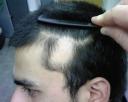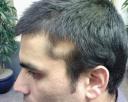Alopecia: What You Need To Know (by Daily Mail).
03.09.2007 in ALOPECIA AREATA, UncategorizedTroubled TV presenter Gail Porter has lost almost all her trademark blonde hair as a result of the condition alopecia areata. Gail, who has said she is ‘bald but not afraid’, said last week that she lost most of her hair overnight while she was in Los Angeles a month ago.
Here, we call on the experts to explain a condition that affects around one in 100 people in the UK, but is still poorly understood:
What is alopecia?
Alopecia, which causes baldness, is thought to be an auto-immune disorder, with the immune system -the body’s defence system – turning on itself.
“There are different types of alopecia with different patterns of hair loss,” says Marilyn Sherlock, chairman of the Institute of Trichologists.
“Alopecia areata – which Gail Porter suffers from – affects around one in 100 people in the UK and has been linked with stress.”
What are the symptoms?
“Typically, one or more small bald patches, about the size of a 50p piece, appear on the scalp. The hair can start to regrow at one site, while another bald patch develops. Hair may also begin to thin all over the head.”
Do the symptoms get worse over time?
Marilyn Sherlock says that there is no way to tell if the symptoms will continue to get worse.
“In some cases, people go on to lose all their scalp hair, which is known as alopecia totalis.
“In rare cases, they may lose all their body hair, too, known as alopecia universalis.
“The hair loss can be sudden and dramatic, as in Gail Porter’s case, or happen slowly over weeks and months.”
What causes it?
“For some reason, the body’s immune system begins to attack its own hair follicles. Special white blood cells in the body, known as T-lymphocytes, cause the hair to stop growing.
“Hair enters into the resting phase and then falls out. The follicles remain active, however, and may start to produce new hair shafts at any time.”
Can worry make it worse?
Stress has been shown to prolong the problem.
“People, particularly young, imageconscious women like Gail Porter, can be extremely anxious about their condition,” says Mrs Sherlock.
“Sadly, this can make the symptoms worse and it becomes a vicious cycle.”
Are there other symptoms apart from baldness?
“Occassionally, the scalp may become sore or sensitive.
“Some people complain that it feels as if their scalp is bruised,” says Mrs Sherlock.
There is no itching, scaling or soreness, however, and the skin on the scalp looks healthy.
The nails may be affected, however, and can look pitted and ridged. Bare patches on eyebrows and beards may also appear.
Is it an inherited condition?
There is strong evidence to suggest that alopecia, like other auto-immune diseases, runs in families. About 25 per cent of patients have a family history of the disorder.
“There does need to be a trigger, however,” says Mrs Sherlock. Triggers that have been identified include stress, sudden shock and even thyroid gland malfunction.
Who gets it?
Alopecia areata usually affects teenagers and young adults, but it can affect people of any age. It is just as common among men as women.
“Children as young as two have been treated for alopecia, as well as people in advanced old age,” says Ruth Bowdage of Alopecia UK.
What about breast-feeding mothers?
Women who have recently given birth do report excessive hair loss, although this is not usually alopecia.
During pregnancy, hormones prolong the growing cycle; excessive shedding afterwards is simply the loss of this hormonal protection.
Is there a cure?
There is no known cure, although there are various treatments which may be effective for some people.
“No one can ever give a patient an accurate prognosis,” explains Mrs Sherlock.
“Some people may get all their hair growing back. Others may have total hair loss for the rest of their lives.” The more dramatic the case of hair loss, the less likely it is to be reversed. The vast majority of sufferers do experience some re-growth, however, which can be any texture and colour.
There are some treatments for alopecia, although most sufferers are advised to wait and see. In mild cases of alopecia areata, doctors may prescribe corticosteroid cream or lotion, which is applied to the bald area.
Retin A cream may help to reverse the problem, or Dithranol (a tar-like ointment) discourages the overgrowth of the outer layer of skin cells.
For more severe cases, doctors may recommend steroid injections or even immunosuppressive drugs. However, this can lead to a lowered resistance to infection.
Sometimes irritants can be applied to the scalp to cause an allergic reaction: the theory is that the harmful TLymphocytes will switch their action away from the hair follicles.
Can zinc supplements work?
Some studies show that zinc supplements, taken orally, may have a beneficial effect by helping to moderate the immune system. However, very high doses are needed. Unpleasant side effects include vomiting and diarrhoea.
Do hair growth treatments, like Regaine, help?
Topical Minoxidil solution, marketed as Regaine, can be useful for some patients with mild alopecia areata. It is not effective for people with the severe form of the condition.
Is it life-threatening?
While the condition is embarrassing and inconvenient, it is not dangerous.
“However, it can be extremely traumatic,” says Ruth Bowdage, “and many sufferers say they have been humiliated because people still treat it as a joke.” “It would be much easier if this type of hair loss was treated seriously as a medical condition.”
Will it recur?
Many people suffer a single episode of alopecia and never have the problem again. Others will have regular episodes throughout their lives.
It is estimated that in approximately 20 per cent of cases in the UK, hair loss recurs or becomes permanent.
For more information on alopecia click here:
http://www.alopeciaonline.org.uk/
Do you have Hair Loss Problems, read our Hair Loss Help








